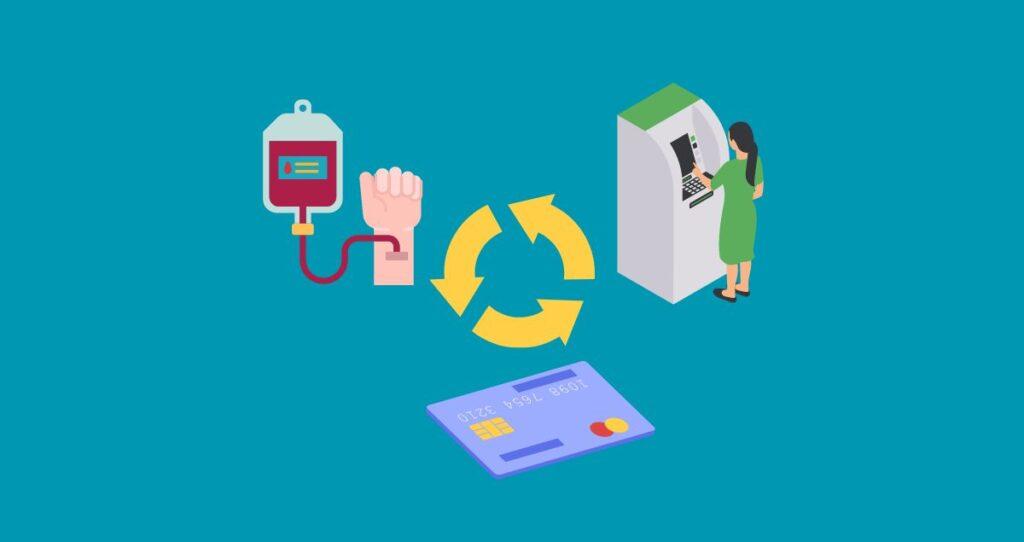Do you want to earn extra money while doing something good for others? If so, you can donate plasma for money. Not only you can make up to $400 a month from plasma donations, but your plasma could also save someone’s life. In addition to getting paid to donate plasma, some plasma companies pay as much as $900 to new plasma donors. You might also get rewards for being a regular donor or for donating during a particular time of the year. If you’re interested in learning more about how to get paid to donate plasma and make a positive impact, keep reading.
Maybe you are a student who is looking for quick cash to pay for school fees, rent, or buy books. Or you are a regular citizen who happens to be low on cash and looking for ways to make money fast. It is also possible that you have a great heart and want to get compensated while making a difference in someone’s life. Whatever the case, donating plasma for money is an effective way to earn extra cash.
In this article, we’ll cover everything you need to know about plasma donation, including eligibility requirements, where to donate plasma for money, risks, and rewards, how much money you can make donating plasma, and tips for maximizing your earnings.
How much money can you make from donating plasma?
If you’re considering donating plasma for money, one of the questions you might be wondering is how much you can make. The amount you get paid to donate plasma depends on several factors such as:
- The location where you donate
- The company you choose, and
- The frequency of your plasma donations.
On average, you can expect to earn around $20 to $50 per donation, which can add up to $400 or more per month if you donate up to the maximum number of times allowed. Keep in mind that the amount you receive can vary depending on the location and the donation center you go with. That is why it is important to check with your chosen donation center for their specific compensation rates.
Besides the regular rate you get paid to donate plasma, most plasma companies give you a sizeable bonus. For example, you can earn up to $900 for becoming a new donor at BioLife Plasma Services.
Other places to donate plasma for money offer different rewards. For example, at Cslplasma, you can earn up to $100 on your first donation and receive over $500 for your first month as a new donor. You can also earn loyalty points which you can redeem for cash back when you join the iGive Rewards program.
How does donating plasma for money work?
The process of donating plasma for money is a relatively simple process that typically takes 1 to 2 hours to complete. When you arrive at the donation center, you’ll need to provide your identification and complete a brief health screening to ensure you’re eligible to donate. You will also go through a finger stick test to examine your protein and hemoglobin levels. Assuming you’re approved, you’ll then be taken to a donation room where you’ll undergo the actual donation process.
During this process, a trained technician will insert a needle into your arm and draw blood from your body. The blood is then separated into its components using a special machine, with the plasma being collected and stored in a separate bag. Other blood components are then returned to your body through the same needle. This process continues until enough plasma has been collected.
Once the donation is complete, you might need to sit down and wait for 15 minutes to allow your body to recover and make sure there are no side effects or allergies. You may feel a bit tired or light-headed after donating plasma, but this should subside within a few hours. Most donation centers recommend that you wait at least 48 hours before donating again, although this can vary depending on your health and the donation center’s policies.
Eligibility Requirements
To donate plasma for money, you must first meet certain eligibility requirements which are listed below.
- You must be at least 18 years old
- You need to weigh at least 110 pounds
- Pass a medical examination before donating plasma, which includes a screening for infectious diseases.
- Provide proof of identification and residency
- Some donation centers may also require that you have a social security number or proof of income.
- Furthermore, individuals with certain medical conditions or taking certain medications may not be eligible to donate plasma. These conditions can include recent tattoos or piercings(in the past 4 months), pregnancy, and certain chronic illnesses.
How often can you give plasma?
Once you have been approved to donate plasma, you may be wondering how often you can donate. The answer to this question depends on the donation center and your health status.
Most donation centers allow donors to give plasma up to twice a week, with at least one day in between donations. According to the U.S. Department of Health and Human Services (HHS.gov), the maximum plasma donation frequency is once in 2 days and no more than twice in 7 days. For example, if you donated plasma on Tuesday and Thursday, the next time you will be allowed to donate plasma is Tuesday of the following week.
How to get started donating plasma for money?
To get started donating plasma and getting paid, the first step is to find a reputable donation center near you. A simple online search will yield plenty of options. However, it’s important to do your research and choose a center that is FDA-approved and has a good reputation in the community.
Before your first donation, you will need to undergo a screening process that typically involves a medical questionnaire and a physical exam. This is to ensure that you are in good health and that your plasma is safe to donate.
Once you pass the screening process, you can start donating plasma. The process typically takes around 1 to 2 hours, and you can donate up to twice a week depending on the guidelines of the donation center.
It is critical to be well-hydrated and well-nourished before donating plasma, as this will make the process go more smoothly and minimize the risk of complications. Additionally, be prepared to sit still for an extended period while the plasma is being collected.
Additionally, use the bathroom before you start donating. This is because if you want to use the bathroom after the plasma donation process has been initiated, you can either hold it in or discontinue the process and not get paid.
What should you bring to the donation center?
If it is your first donation, there are some documents you need to bring. The following is a list of documents you might need to bring when visiting the center for the first time.
- A valid driver’s license or another form of government-issued ID
- Have a social security card
- Proof of your residence
- Your new donor welcome bonus if applicable
What should you eat and drink before donating plasma?
The success of your plasma donation will depend on what you ate or drank before visiting the donation center. It is recommended that you eat an iron and protein-rich meal and drink enough water. If you don’t like drinking that much water, you can drink juices or other non-caffeine beverages.
The following is a checklist of what you can eat and drink before visiting the donation center.
- Be hydrated. Drink at least 4 to 6 ounces of water, juices, and related caffeine-free drinks within two to three hours before donating.
- Have enough sleep (7 to 8 hours of sleep)
- No smoking within two to three hours before your plasma donation
- Do not drink alcoholic beverages within 24 hours before you are scheduled to donate
- Eat a protein-rich meal. According to donatingplasma.org, you must follow the recommended diet of at least 50 to 80 grams of daily protein.
Do I need to make an appointment to donate plasma?
Most plasma donation centers do not require an appointment. All you have to do is to know their hours of operation and don’t show up at the last minute. For example, if the plasma donation center closes at 7 PM and you show up at 6:45 PM, you might not be able to get in especially if they are fully booked.
But, making an appointment is good as it helps the business move smoothly and allows you to select non-peak hours.
Best places to donate plasma for money
If you want to get paid to donate plasm, it’s important to find a reputable and reliable donation center. Not all centers offer the same care and earning potential. That is why it is critical to do your research before choosing the right donation center that gives you the right compensation for your plasma.
Some of the best places to donate plasma and get paid include CSL Plasma, BioLife Plasma Services, and Grifols. These centers have a strong reputation for providing a safe and comfortable donation experience, along with fair compensation for your time and effort.
At these top three donation centers, donors can earn up to $400 per month for their plasma donations which will vary by location and company. In addition, you might get a big sign-up bonus on your first donation. For example, BioLife offers up to a $900 sign-up bonus which varies depending on your location. You might also receive different rewards and compensation aside from the actual plasma payment. In addition to compensation, these centers also offer convenient scheduling options, flexible hours, and friendly staff members who are there to support you throughout the donation process.
Top 9 places to donate plasma for money
The following is a list of the best plasma donation companies to make money donating plasma.
- BioLife
- CSL Plasma
- Grifols
- BPL Plasma
- Immunotek
- Interstate Blood Bank
- KEPPlasma
- Octapharma Plasma
- American Red Cross
How do you get compensated when you donate plasma for money?
Plasma donation centers offer various compensation models that vary depending on where you go. Some facilities pay a flat rate per donation while others compensate donors based on the volume of plasma collected, or the number of donations made in a given period.
For example, you can get paid $20 on your first donation and $50 on your second donation. The second donation is usually higher as an incentive to motivate you to go for the second time.
So, what do you get paid to donate plasma? Most donation centers give you a reloadable prepaid debit card. Whenever you donate plasma, the payment gets loaded on the same card. You can then use the money on your card or withdraw the money from an ATM.
While financial compensation is an important factor, it’s important to remember that donating plasma is a valuable contribution to medical research and treatment. By donating plasma at a reputable center, you can earn money while also making a difference in the lives of those who need it most.
Risks and rewards of donating plasma
Donating plasma for money is a great way to earn extra cash, but it’s not without its risks. Before you decide to donate, it’s important to consider both the rewards and potential drawbacks. On the positive side, donating plasma can help save lives and further medical research. Additionally, you get paid to donate plasma which is one of the fastest ways to make money.
However, there are also some potential risks to consider. The most common side effects include feeling lightheaded or dizzy, as well as experiencing mild dehydration. In rare cases, donors may experience more serious complications, such as allergic reactions or infections. Despite these risks, most people can donate plasma safely and without any major issues.
Tips to maximize your plasma earnings
If you are low on cash and want to donate plasma for money, you might as well do all you can to maximize your earnings. To make the most of your plasma donations, there are a few things you can do which are illustrated below.
Stay hydrated
First and foremost, stay hydrated by drinking plenty of water before and after your donation. From my own experience, drinking enough water or juices before donation makes it easy and faster to donate. For every round of blood drawn from your body, there will be enough plasma due to being fully hydrated. Drinking enough water before donation can also help reduce the risk of feeling lightheaded or dizzy afterward.
Eat healthy food
Eating healthy meals beforehand is essential in keeping your blood sugar levels stable. Furthermore, eating high-protein meals is critical to meeting protein requirements for each plasma donation.
Pick a donation center that compensates frequent donors
If your main goal is to donate plasma for money, then the best way to increase your earnings is by finding a donation center that offers bonuses or rewards for frequent donors. Some centers offer loyalty programs that provide incentives for coming in regularly. Other centers may have special promotions for first-time donors or for referring friends to donate. For example, you can earn up to $900(the amount varies by location) in your first month when you donate plasma at BioLife for the first time.
Know the right time to donate
It’s also important to pay attention to the time and day when you donate. Some centers may offer higher compensation during non-peak hours or on certain days of the week. Do some research and find out if there are any special promotions or offers available at the donation center you plan to visit. Also, make sure that you don’t miss the second donation of the two donations allowed in 7 days. Most centers give you a low rate on your first donation and a bigger pay on your second. This is by design and it is an incentive to make sure that you show up for the second donation and collect a bigger paycheck.
Is donating plasma worth it?
While donating plasma for money can be a great way to supplement your income, it’s important to weigh the pros and cons before deciding if it’s worth your time. On the one hand, plasma donation is a relatively easy and low-risk way to make money. It doesn’t require any special skills or training, and most people are eligible to donate. Plus, you can usually donate twice a week, which can add up to a significant amount of money over time.
Let us look at a personal experience. From my personal experience, I used to make $20 on my first donation and $50 on my second donation by donating plasma at BioLife. This translated to $70 per week or $280 per month. My rent was $545 a month. So, the money I made from donating plasma was paying more than half of my rent and it gave me significant financial relief during my college life.
So, if you are in a similar situation or need quick and easy-to-get cash, then being a plasma donor is a perfect route to consider. Maybe your income is not enough or you simply want to donate plasma for a good cause. No matter the case, donating plasma is always worth it.
Keep in mind that there are also some potential downsides to donating plasma. For one thing, the process can be time-consuming, especially if you have to wait in long lines or if the donation center is far from your home or workplace. Additionally, some people may experience side effects such as fatigue or lightheadedness after donating, which can make it difficult to go about your day-to-day activities.
Overall, whether or not donating plasma is worth it depends on your circumstances and priorities. If you’re looking for a relatively easy and flexible way to earn some extra money, donating plasma could be a good option. However, if you’re short on time or have health concerns, it may not be the best choice for you. Ultimately, it’s up to you to weigh the pros and cons and decide if the benefits of plasma donation outweigh any potential drawbacks.
What could disqualify you from being a plasma donor?
Before can donate plasma for money, it’s important to be aware that not everyone is eligible to donate. Various factors could disqualify you from being a plasma donor. One of the most crucial factors is your overall health. If you have any medical conditions or are taking certain medications, you may not be able to donate. Some of these conditions include heart disease, diabetes, and hepatitis.
Additionally, if you have recently traveled to certain countries or have engaged in high-risk behavior, such as drug use or unprotected sex, you may not be able to donate. Having a recent tattoo or a piercing might also disqualify you from plasma donation for 4 months or more.
Other factors that could disqualify you from donating plasma include your weight, age, and overall health history. Typically, you have to be 18 years old and weigh at least 110 lbs to qualify for plasma donation. It’s important to note that these factors can vary depending on the plasma donation center you visit. So, check with the specific center beforehand to determine if you’re eligible.
What medication can prevent you from donating plasma
One of the most important factors to consider before you donate plasma for money is the medication you take. Certain medications can impact your eligibility to donate plasma.
Some common medications that may disqualify you from donating plasma include antibiotics, antidepressants, and blood thinners. To prevent the transmission of viruses and bacterial infections, you might be required to finish taking your medication and have no symptoms of the disease before donating plasma.
According to BioLife Plasma Services, you may be able to donate depending on the reason you are being treated with antibiotics. If you recently received immunization, your eligibility to donate will also vary based on the reasons you received a vaccination and the presence of symptoms.
So, no matter how much you want to donate plasma for money, it is always important to consider the lives at stake. Lying about the medication you are taking might result in having your plasma rejected which could cause a delay for someone who needs emergency treatment. For this reason, It’s important to disclose all medications you are currently taking during the screening process. This will help the plasma donation center determine your eligibility and take necessary precautions to ensure the safety of both the donor and recipient.
Plasma donation weight requirements
Although the idea of donating plasma for money sounds great, you might not be eligible to donate if you do not weigh at least the minimum weight requirements. Generally, the minimum weight requirement for plasma donation is 110 pounds. It is important to note that weight limits may vary depending on the donation center.
If you are not sure about weighing enough to donate plasma for money, don’t worry. During the screening process, you will be required to step on the scale to determine your weight as part of the eligibility assessment. If you fall below the weight requirement, you will be deemed ineligible for plasma donation.
To regularly donate plasma for money, try to maintain a healthy weight and lifestyle. Eating a nutritious diet and getting regular exercise are essential in keeping your body in good condition, making you an ideal candidate for plasma donation.
Do they drug test you before donating plasma?
One of the most commonly asked questions is whether a drug test is required before anyone can donate plasma for money. According to FloHealth, a drug test is not required to donate plasma. However, if you are taking certain prescription drugs, are visually intoxicated, or have visible signs of injectable drug use, you will not be eligible to donate plasma.
How much is my plasma worth?
During the plasma donation process, many donors begin to wonder how much their plasma is worth. The answer is that it varies depending on the donation center, location, and plasma collected. On average, donors can expect to earn between $20 to $50 per donation, with some centers offering bonuses for regular donations.
While you can donate plasma for money, the compensation for plasma donation is not meant to be a significant source of income. Rather, it is a way for donors to earn a little extra money while helping those in need.
If you are interested in donating plasma for money, it’s important to research donation centers in your area to find the one that offers the best payout. Some centers may also offer incentives for referring friends or for donating during specific times of the year. This will help you maximize your plasma donation earning potential.
Is it painful to donate plasma?
Many people who are considering donating plasma for the first time may be hesitant due to concerns about pain. It’s natural to wonder what to expect during the donation process and if it will be a painful experience. When I started donating plasma, I had the same feeling. Not knowing what to expect and the rumor that the size of the needle was a bit large affected my first donation experience.
While there may be some discomfort associated with donating plasma, it is generally considered to be a relatively painless procedure. Before the donation begins, a medical professional will use a sterile needle to access a vein in your arm. When the needle is inserted, you will feel a slight pinch or prick, but this discomfort is brief and usually subsides quickly.
During the donation itself, you may feel a sensation of pressure in your arm as the plasma is collected. This is normal and not usually painful, although some donors may feel light-headed or dizzy during the process. If you experience any discomfort, it’s important to notify the medical staff immediately so they can take steps to ensure your safety and comfort.
Which plasma donation pays the most?
If you have decided to donate plasma for money, you may be wondering which donation center pays the most. While most donation centers pay similar rates like $20 on your first visit and $30 on your second visit or a flat rate such as $40 per visit, there are some differences to be aware of. One important factor is location. Different regions will have higher or lower rates than others depending on local demand and compensation.
Another consideration is whether you meet certain bonus eligibility criteria such as being a regular donor. Some centers offer bonuses or other incentives for these types of donors.
The following are pay rates you should expect when donating plasma at the following donation centers. These rates will be influenced by seasonal donation incentives, location, and being a first-time donor where you make a higher rate on your first month.
- BioLife Plasma Services. $20 to 50 per donation and can earn up to $900 in your first month
- CSL Plasma: $20 to $100 per donation and can earn more than $500 in your first month
- Grifols: $30 to $90 per donation
- BPL Plasma: $20 to $50 per donation
- Octapharma Plasma: Make up to $400/mo
- Immunotek. Up to $50 per visit
If you’re interested in making the most money from your plasma donations, choose a great center with fair compensation rates.
What happens when you donate too much plasma?
Donating plasma is a safe and easy way to earn extra cash while also giving back to those in need. However, it is important to be aware of the potential risks and side effects that may occur if you donate too much plasma. Donating too frequently or too much at one time can lead to dehydration, fatigue, and other health issues.
When you donate plasma, the plasma is separated from your blood, and the remaining blood components are returned to your body. Because of this process, donating plasma can result in a temporary decrease in blood protein levels and other nutrients that are essential for your overall health. If you donate too frequently or too much at once, your body may not have enough time to replenish these nutrients, which can lead to negative health effects.
To avoid these risks, it is important to follow the guidelines set by the plasma donation center and to only donate within the recommended timeframe. With proper hydration and healthy meals after each donation, your blood volume and protein levels can easily be replenished in as little as 48 hours. That is why it is recommended to donate plasma once in two days with no more than 2 times in 7 days.
Is plasma donation taxable by the IRS?
One question that often comes up is whether plasma donation is taxable by the IRS. The answer is yes, plasma donation is considered taxable income.
According to the IRS, any income received, including compensation for plasma donation, must be reported on your tax return. This means that the money you receive for your plasma donations is subject to income tax, and you will need to report it when you file your taxes.
It’s important to keep track of your plasma donations and the compensation you receive for them throughout the year. This will make it easier to accurately report your income when tax season comes around. Make sure you keep thorough records and save any documentation related to your plasma donations, such as receipts or payment confirmations.
Can you donate plasma if you have tattoos?
Does having tattoos disqualify you from donating plasma for money? The answer is no. Having tattoos does not automatically disqualify you from donating plasma. However, there are some restrictions in place for recent tattoos to ensure that your plasma is safe for the recipient.
If you have recently gotten a tattoo or piercing, you may need to wait a certain amount of time before you can donate. This waiting period can vary but it is typically around 4 to 12 months. According to BioLife, a recent tattoo or piercing will affect your eligibility to donate for four months. Additionally, if your tattoo or piercing was done outside of the U.S., you may be required to wait for 12 months before you can donate plasma.
Furthermore, if your tattoo was done in an unregulated setting or with unsterilized equipment, you may be permanently disqualified from donating plasma.
How old do you have to be to donate plasma?
Donating plasma for money is a great way to earn extra cash while helping those in need. However, you might not be eligible to donate plasma if you have not attained a proper age.
The age requirement for plasma donation varies depending on the donation center and state laws. In general, donors must be at least 18 years old to donate plasma. Some centers may allow 16 and 17-year-olds to donate with parental consent, while others may require donors to be 21 or older.
How can I make my plasma donation go faster?
The process of donating plasma fast begins ways before the actual donation starts. First, it is crucial to have enough sleep, eat healthy meals rich in protein and iron, and stay hydrated. To avoid long waiting times, schedule an appointment online and avoid peak hours. Completing some of the questionnaires online before visiting the donation center can also save you some time. For example, if you donate at Octapharma Plasma, you can easily download the OctaPass and complete online questionnaires ahead of time.
Finally, allow your body to recover before donating again. Having at least two days between each donation can make it faster to donate plasma.
How long does it take to donate plasma for money?
When it comes to donating plasma for money, the first donation usually takes longer. This is because you must undergo some health-related questionnaires and do a physical exam. In addition, your information must be entered into the system to make sure that you are all set to start donating plasma and getting paid.
Your first plasma donation usually lasts between 1.5 to 2.5 hours which varies by location and the time you showed up for donations. For example, during peak hours, the waiting time increases which contributes to how long it takes you to donate plasma.
However, after your first donation, other donations go much faster since you don’t have to undergo examinations and checking. All you have to do is show up, get a finger-prick test for hemoglobin and protein evaluation, and wait for your seat to be available. For regular plasma donors, the donation process usually takes about 1 hour to complete.
Best things to do when donating plasma
Unlike blood donation which can last as little as 10 minutes, plasma donation takes a bit longer. In addition, you will have nothing to occupy you while donating plasma. For this reason, you need to bring something that can occupy you while giving plasma.
Some of the things you can do while donating plasma include but are not limited to reading books, watching movies, listening to music, or watching a TV. Some people especially students do their homework while donating plasma. You can also catch up with friends or simply keep up with your work.
The bottom line
Donating plasma for money is a unique way to earn quick cash while also helping those in need. With the ability to earn up to $400 a month and the potential for rewards and bonuses, plasma donation can provide a much-needed supplement to your income. By following the eligibility requirements and tips for maximizing your earnings, you can make the most of this opportunity.
Other ways to make money
22 best websites to find freelance proofreading jobs in 2023
11 easy ways to make money as a college student









